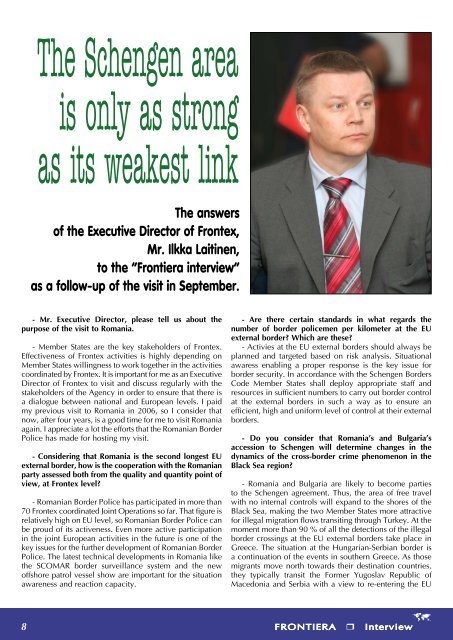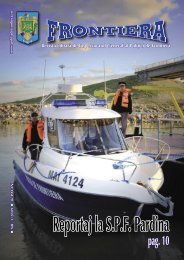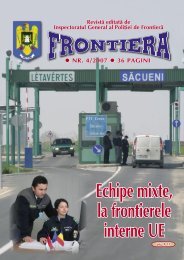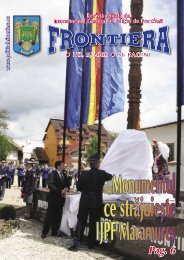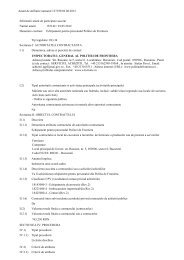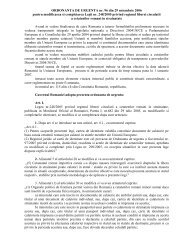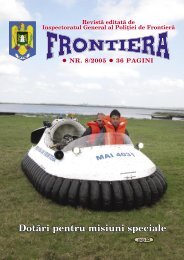Nr. 11-12/2010 - Politia de Frontiera
Nr. 11-12/2010 - Politia de Frontiera
Nr. 11-12/2010 - Politia de Frontiera
You also want an ePaper? Increase the reach of your titles
YUMPU automatically turns print PDFs into web optimized ePapers that Google loves.
The Schengen area<br />
is only as strong<br />
as its weakest link<br />
The answers<br />
of the Executive Director of Frontex,<br />
Mr. Ilkka Laitinen,<br />
to the “<strong>Frontiera</strong> interview”<br />
as a follow-up of the visit in September.<br />
- Mr. Executive Director, please tell us about the<br />
purpose of the visit to Romania.<br />
- Member States are the key stakehol<strong>de</strong>rs of Frontex.<br />
Effectiveness of Frontex activities is highly <strong>de</strong>pending on<br />
Member States willingness to work together in the activities<br />
coordinated by Frontex. It is important for me as an Executive<br />
Director of Frontex to visit and discuss regularly with the<br />
stakehol<strong>de</strong>rs of the Agency in or<strong>de</strong>r to ensure that there is<br />
a dialogue between national and European levels. I paid<br />
my previous visit to Romania in 2006, so I consi<strong>de</strong>r that<br />
now, after four years, is a good time for me to visit Romania<br />
again. I appreciate a lot the efforts that the Romanian Bor<strong>de</strong>r<br />
Police has ma<strong>de</strong> for hosting my visit.<br />
- Consi<strong>de</strong>ring that Romania is the second longest EU<br />
external bor<strong>de</strong>r, how is the cooperation with the Romanian<br />
party assessed both from the quality and quantity point of<br />
view, at Frontex level?<br />
- Romanian Bor<strong>de</strong>r Police has participated in more than<br />
70 Frontex coordinated Joint Operations so far. That figure is<br />
relatively high on EU level, so Romanian Bor<strong>de</strong>r Police can<br />
be proud of its activeness. Even more active participation<br />
in the joint European activities in the future is one of the<br />
key issues for the further <strong>de</strong>velopment of Romanian Bor<strong>de</strong>r<br />
Police. The latest technical <strong>de</strong>velopments in Romania like<br />
the SCOMAR bor<strong>de</strong>r surveillance system and the new<br />
offshore patrol vessel show are important for the situation<br />
awareness and reaction capacity.<br />
- Are there certain standards in what regards the<br />
number of bor<strong>de</strong>r policemen per kilometer at the EU<br />
external bor<strong>de</strong>r? Which are these?<br />
- Activies at the EU external bor<strong>de</strong>rs should always be<br />
planned and targeted based on risk analysis. Situational<br />
awaress enabling a proper response is the key issue for<br />
bor<strong>de</strong>r security. In accordance with the Schengen Bor<strong>de</strong>rs<br />
Co<strong>de</strong> Member States shall <strong>de</strong>ploy appropriate staff and<br />
resources in sufficient numbers to carry out bor<strong>de</strong>r control<br />
at the external bor<strong>de</strong>rs in such a way as to ensure an<br />
efficient, high and uniform level of control at their external<br />
bor<strong>de</strong>rs.<br />
- Do you consi<strong>de</strong>r that Romania’s and Bulgaria’s<br />
accession to Schengen will <strong>de</strong>termine changes in the<br />
dynamics of the cross-bor<strong>de</strong>r crime phenomenon in the<br />
Black Sea region?<br />
- Romania and Bulgaria are likely to become parties<br />
to the Schengen agreement. Thus, the area of free travel<br />
with no internal controls will expand to the shores of the<br />
Black Sea, making the two Member States more attractive<br />
for illegal migration flows transiting through Turkey. At the<br />
moment more than 90 % of all the <strong>de</strong>tections of the illegal<br />
bor<strong>de</strong>r crossings at the EU external bor<strong>de</strong>rs take place in<br />
Greece. The situation at the Hungarian-Serbian bor<strong>de</strong>r is<br />
a continuation of the events in southern Greece. As those<br />
migrants move north towards their <strong>de</strong>stination countries,<br />
they typically transit the Former Yugoslav Republic of<br />
Macedonia and Serbia with a view to re-entering the EU<br />
8<br />
F R O N T I E R A I n t e r v i e w


